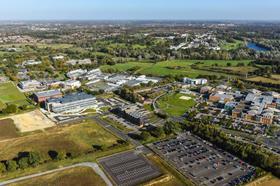
A new UK centre of excellence is being set up bypartners on the Norwich Research Park toimprove global food security which is threatened by the effects of climate change.
The Norwich Institute for Sustainable Development,launched this week, will focus ondevelopingsolutions toenablefarmers all over the world tobuild resilience tovariability in rainfall, periods of drought and more extreme and unpredictable weather events.
The Institute is launched with £750,000 of funding from the John Innes Foundation, and is thefirstformal partnership of theinternationallyrecognisedexpertiseinplant science from the John Innes Centreand thesocial sciencesfrom UEA’s School of International Development.
Thenewinstitute will be based at Norwich Research Park and also involves researchers from theQuadramInstitute, Earlham Institute and The Sainsbury Laboratory.
Research shows that yields of major staple foods like grains,fruitsand vegetablesare expected to decreasebybetween 3 and 10 per cent per degree of warming, and with global temperatures soaring year on year, it is hoped the work of the institute can help tomitigatethese stark predictions.
Communitiesall over the globeare impacted by food shortages. Food pricesare rising,thenutritional quality of the foodavailable is often insufficient, and supply chain disruptionsand in some cases,conflict, all cause nutritional deficits, withless developed countriesoften experiencing more of an impact.
Professor Nitya Rao, director for the new institute said: “This is the most critical issue facing the world today. If we don’t act now crop yields will continue to reduce and become more unreliable over time.
“People in the UKand across the worldcould soon see everyday foods like bread,cerealsandtomatoesbecomingmore scarceandmoreexpensive. This will affect those who are most vulnerable who may be unable to access adequate, nutritious and affordable food for themselves and their families.
“It’snot all bad news though,as researchers have made considerable progress over the last 50 years, with technologies now available for dealing with pests, diseases and water scarcity,alongside attentionto what people actually need.Soa key focus for us is to change the way we work – to make sure that innovations meet farmers’ needs around theworld,supporting farming communities to make agriculture more resilientand supporting the world’s food supply.”
The institute supports continued progress towards the UN Sustainable Development Goals, and the UK government’s stated ambition to “leverage wider UK expertise through the UK’s world-leading science, research and development base to tackle global problems”.



